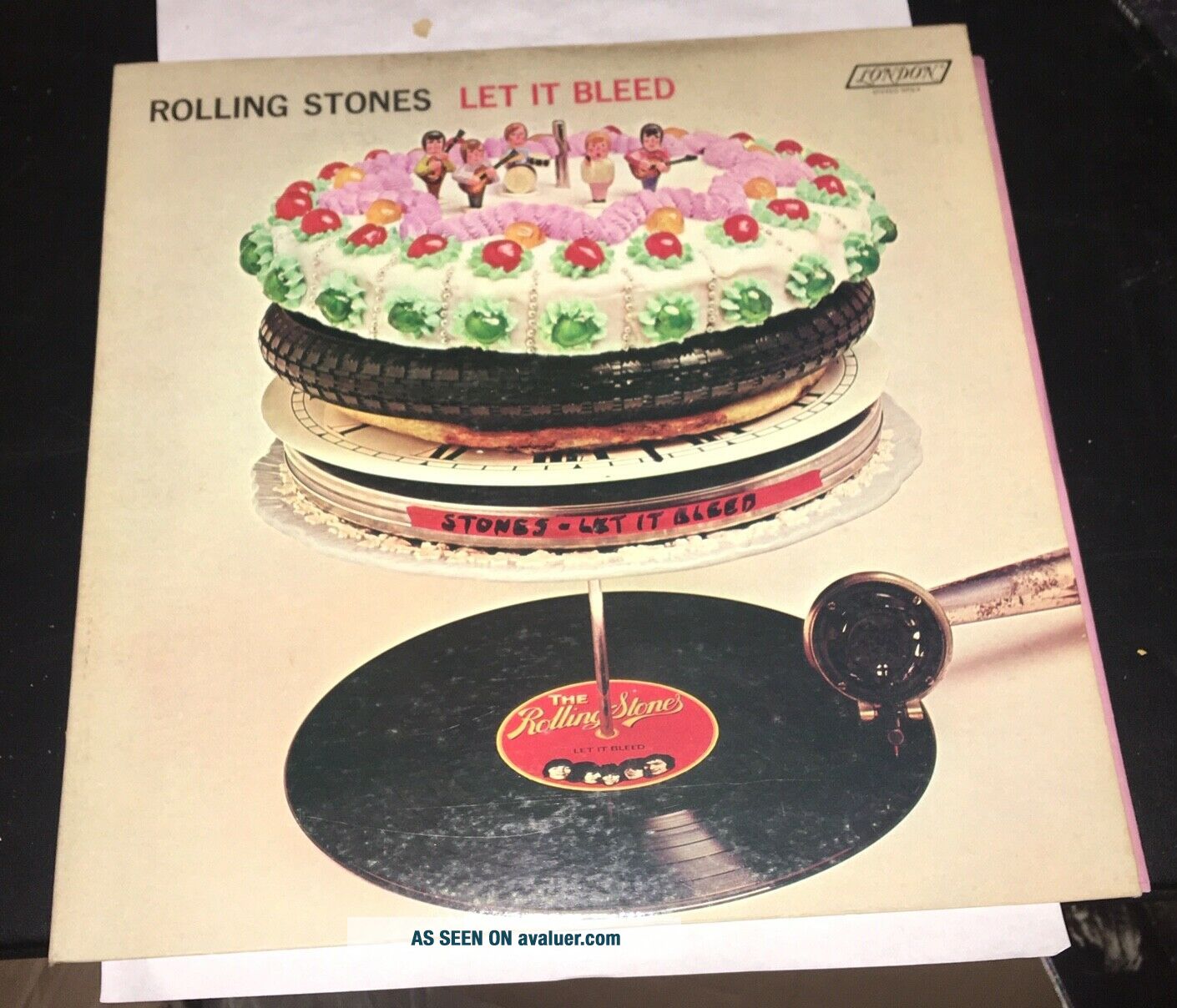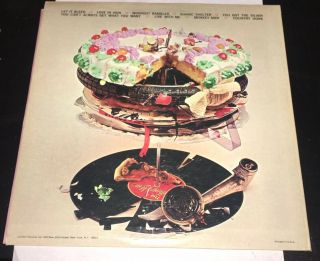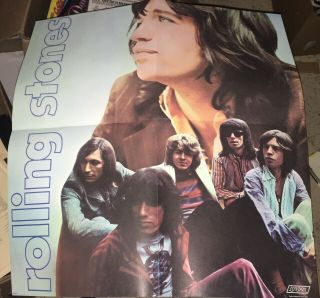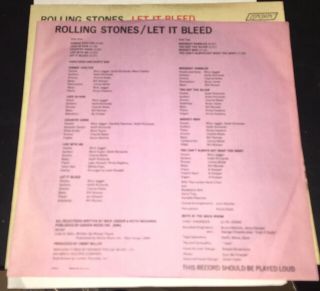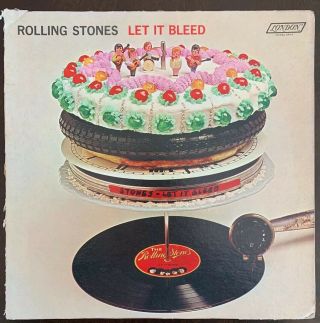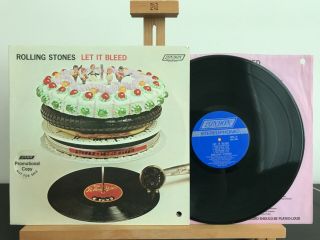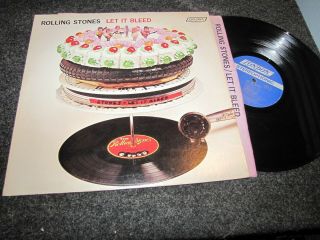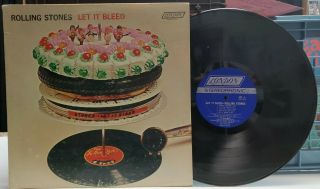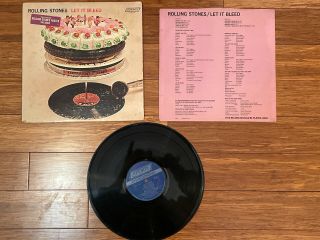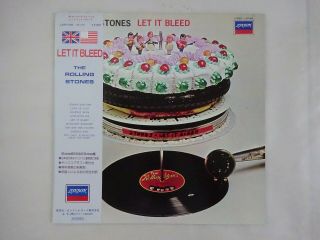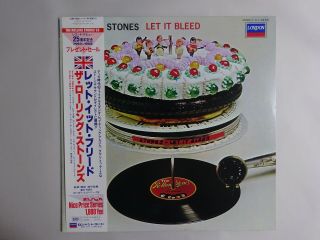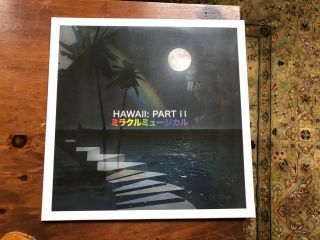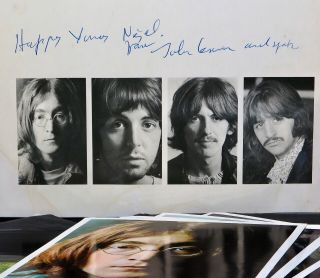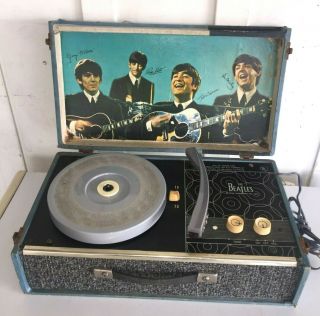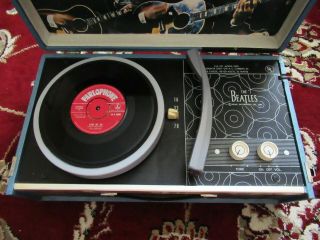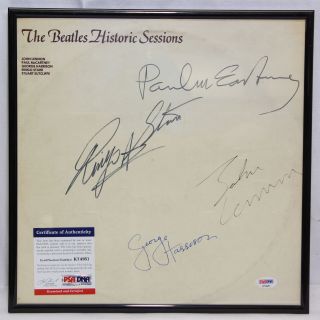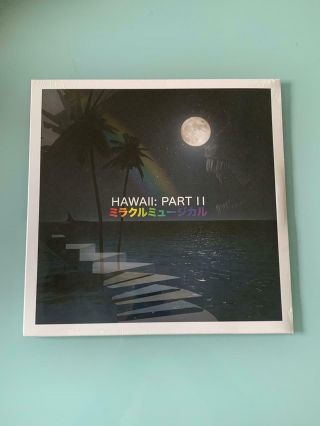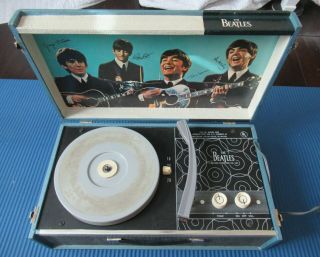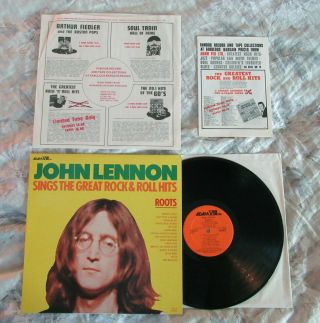Rolling Stones Let It Bleed London Records NPS - 4 1969 Rare W/ Poster EX/VG,
Item History & Price
| Reference Number: Avaluer:8478750 | Artist: Rolling Stones |
| Release Year: 1969 | Style: British Invasion, Folk/Country Rock, Psychedelic Rock, Rock 'n' Roll |
| Genre: Rock | Record Label: London |
Manufactured by Nanker Phelge Music Ltd., an ABKCO record company.Barcode and Other IdentifiersMatrix / Runout (Side A Label): XZAL 9363Matrix / Runout (Side B Label): XZAL 9364
This article is about the 1969 album by The Rolling Stones. For other uses, see Let It Bleed (disambiguation).Let It BleedLetitbleedRS.jpgStudio album by The Rolling StonesReleased 5 December 1969Recorded November 1968, February–July, October–November 1969Studio Olympic Studios, London; Elektra Studios, Los Angeles; Sunset Sound, Los Angeles[1]Genre Hard rock blues country bluesLength 42:21Label Decca (UK) London (US)Producer Jimmy MillerThe Rolling Stones chronologyBeggars Banquet(1968) Let It Bleed(1969) Sticky Fingers(1971)Singles from Let It Bleed"Let It Bleed"/"You Got the Silver"Released: January 1970 (Japan only)Let It Bleed is the eighth British and tenth American studio album by English rock band the Rolling Stones, released in December 1969 by Decca Records in the United Kingdom and London Records in the United States. Released shortly after the band's 1969 American Tour, it is the follow-up to 1968's Beggars Banquet.
The album was recorded during a period of turmoil in the band; Brian Jones, the band's founder and original leader, had become increasingly unreliable in the studio due to heavy drug use, and during most recording sessions was either absent, or so incapacitated that he was unable to contribute meaningfully. He was fired in the midst of recording sessions for this album, and replaced by Mick Taylor. Jones appeared on this album on only two songs, playing backing instruments, and went on to die within a month of being fired. Taylor had been hired after principal recording was complete on many of the tracks, and likewise appears on only two songs, having recorded some guitar overdubs. As such, Keith Richards was the band's sole guitarist during most of the recording sessions; being responsible for nearly all of the rhythm and lead parts. The other Stones members (Mick Jagger, Bill Wyman and Charlie Watts) appear on nearly every track, and significant additional contributions were made by percussionist Jimmy Miller (who also produced the album), keyboardists Nicky Hopkins and Ian Stewart, and numerous other guest musicians.
The album charted as a top-ten album in several markets, including reaching number one in the UK and number three in the US. While no highly-charting singles were released from the album, many of the album's songs became staples of Rolling Stones live shows and on rock radio stations for decades to come, including two gospel-infused songs, "Gimme Shelter" and "You Can't Always Get What You Want", both of which ranked highly on retrospective "best ever" songs lists, including 2004's "500 Greatest Songs of All Time" by Rolling Stone magazine.
Although the Stones had begun the recording of "You Can't Always Get What You Want" in November 1968, before Beggars Banquet had been released, recording for Let It Bleed began in earnest in February 1969 and continued sporadically until early November.[2] Brian Jones had, over the course of the recording of the previous two albums, become increasingly unreliable. Though present in the studio, he was frequently too intoxicated to contribute meaningfully, and after a motorcycle accident in May 1969, missed several recording sessions whilst recovering. Always a talented multi-instrumentalist, Jones had previously contributed extensively on guitar, forming an integral part of the dual-guitar sound that was central to the band's groove. He was fired from the band during the recording of Let It Bleed, having performed on only two tracks: playing autoharp on "You Got the Silver", and percussion on "Midnight Rambler". As with the previous album, most of the guitar parts were recorded instead by the band's other guitarist, Keith Richards during the period of principal recording. Jones's replacement, Mick Taylor, appears on just two tracks, "Country Honk" and "Live with Me", having contributed some overdubs during the October Los Angeles sessions. He also appears on "Honky Tonk Women", a stand-alone single recorded during the Let It Bleed sessions.
Keith Richards sang his first solo lead vocal on a Rolling Stones recording with "You Got the Silver", [3] having previously sung harmony and background vocals with primary vocalist Mick Jagger on "Connection" and shared alternating lead vocals with Jagger on parts of "Something Happened to Me Yesterday" and "Salt of the Earth". Additional vocals were provided by the The London Bach Choir, who sang on "You Can't Always Get What You Want". The choir distanced themselves from their contribution, however, citing what author Stephen Davis terms its "relentless drug ambience".[4] Bassist Bill Wyman appears on every track except for two, on which Richards played bass. Drummer Charlie Watts performed on all of the tracks except for "You Can't Always Get What You Want"; he struggled to attain the sought-after rhythm, so producer Jimmy Miller filled in for him instead.
Let It Bleed was originally scheduled for release in July 1969. Although "Honky Tonk Women" was released as a single that month, the album itself suffered numerous delays and was eventually released in December 1969, after the band's US tour for it had already completed.[citation needed] The majority of the album was recorded at Olympic Studios in London, with further work taking place at Elektra Sound Recorders Studios, in Los Angeles, California, while the Stones prepared for the tour.[5] The Los Angeles-recorded portions included overdubs by guest musicians Merry Clayton (on "Gimme Shelter"), Byron Berline (on "Country Honk"), [6] and Bobby Keys and Leon Russell (on "Live with Me").[7] Finally, an unreleased version of "I Don't Know The Reason Why (a. k. a. Hillside Blues)" was also recorded there in October 1969 with Mick Taylor.
Musical styleAs with Beggars Banquet the previous year, the album marks a return to the group's more blues-based approach that was prominent in the pre-Aftermath period of their career. The main inspiration during this string of albums was American roots music and Let It Bleed is no exception, drawing heavily from gospel (evident in "Gimme Shelter" and "You Can't Always Get What You Want"), Hank Williams and Jimmie Rodgers ("Country Honk"), [8] Chicago blues ("Midnight Rambler"), [9] as well as country blues ("You Got the Silver", "Love in Vain") and country rock ("Let It Bleed").[10]
You Can't Always Get What You WantMENU0:00A sample of The Rolling Stones's "You Can't Always Get What You Want" from Let It BleedProblems playing this file? See media help.According to Don Heckman from The New York Times, Let It Bleed was a "heavy" and "passionately erotic" album of hard rock and blues, influenced by African-American music.[11] Richie Unterberger, writing for AllMusic, said it "extends the rock and blues feel of Beggars Banquet into slightly harder-rocking, more demonically sexual territory."[12] Mojo magazine's James McNair felt the record had an emphasis on "earthy" country blues.[13]
Through their experimentation during the mid-1960s, the band had developed an eclectic approach to arrangements. Slide guitar playing is prominent (played entirely by Richards, except "Country Honk", which was performed by Mick Taylor), and is featured on all songs except "Gimme Shelter", "Live with Me" and "You Can't Always Get What You Want", giving the album an authentic blues feel throughout. In addition, an array of session musicians embellish the songs with various instruments. Alongside the piano performances (Ian Stewart, Nicky Hopkins), the record included fiddle (Byron Berline), [8] mandolin (Ry Cooder), [14] organ and French horn (Al Kooper), [15] as well as vibes (Bill Wyman)[16] and autoharp (Wyman and Brian Jones).[17][18] Of more importance, however, was the debut of both renowned saxophonist Bobby Keys on "Live with Me", a musician who was integral at giving the group's arrangements a soul/jazz background, and guitarist Mick Taylor, who took on lead guitar duties with technically proficient playing, giving the band a harder rock sound during the late 1960s and early 1970s.[19]
LyricsGenerally, the album's lyrics deal with 1960s life; there is social commentary on the Vietnam War ("Gimme Shelter"), as well as the hippie movement, drug culture and politics ("You Can't Always Get What You Want"), but at the same time there are love-related topics, ranging from desolate ("Love in Vain", written by Robert Johnson), to heartwarming ("You Got the Silver", written by Richards), sensual, innuendo-filled ("Let It Bleed"), and humorous ("Live with Me"). Moreover, "Monkey Man" satirizes and comments on the band's public image and lifestyle while "Midnight Rambler" has a very cinematic, suspenseful approach, talking about its titular serial killer (inspired by Albert DeSalvo) in the third-person before Jagger slowly assumes the role after the first half of the song.
The lyrics found on Let It Bleed are often noted for their violent and cynical undercurrents. Jann Wenner, in a 1995 Rolling Stone interview with Jagger, described the album's songs as "disturbing" and the scenery as "ugly". He also asked Jagger if the Vietnam War played a role in the album's worldview. Jagger said: "I think so. Even though I was living in America only part time, I was influenced. All those images were on television. Plus, the spill out onto campuses".
PackagingThe album cover displays a surreal sculpture designed by Robert Brownjohn. The image consists of the Let It Bleed record being played by the tone-arm of an antique phonograph, and a record-changer spindle supporting several items stacked on a plate in place of a stack of records: a film canister labelled Stones – Let It Bleed, a clock dial, a pizza, a motorcycle tyre and a cake with elaborate icing topped by figurines representing the band. The cake parts of the construction were prepared by then-unknown cookery writer Delia Smith.[20] The reverse of the LP sleeve shows the same "record-stack" melange in a state of disarray.[21] The artwork was inspired by the working title of the album, which was Automatic Changer.[22]
Jagger originally asked artist M. C. Escher to design a cover for the album; Escher declined.[23][24] The album cover was among the ten chosen by the Royal Mail for a set of "Classic Album Cover" postage stamps issued in January 2010.[25][26]
Release and receptionProfessional ratingsRetrospective reviewsReview scoresSource RatingAllMusic 5/5 stars[27]Encyclopedia of Popular Music 5/5 stars[28]Entertainment Weekly A[29]The Great Rock Discography 9/10[28]Music Story 5/5 stars[28]MusicHound Rock 5/5[30]NME 9/10[31]Rolling Stone 5/5 stars[32]The Rolling Stone Album Guide 5/5 stars[33]Released in December, Let It Bleed reached number 1 in the UK (temporarily demoting The Beatles' Abbey Road) and number 3 on the Billboard Top LPs chart in the US, where it eventually went 2× platinum. In a contemporary review for Rolling Stone magazine, music critic Greil Marcus said that the middle of the album has "great" songs, but "Gimme Shelter" and "You Can't Always Get What You Want" "seem to matter most" because they "both reach for reality and end up confronting it, almost mastering what's real, or what reality will feel like as the years fade in."[34]
Let It Bleed was the Stones' last album to be released in an official mono version, which is rare and highly sought-after today. This mono version is merely a 'fold-down' of the stereo version. Nevertheless it was included in the box-set The Rolling Stones in Mono (2016). The album was released in US as an LP record, reel to reel tape, audio cassette and 8-track cartridge in 1969, and as a remastered CD in 1986. In August 2002, it was reissued in a remastered CD and SACD digipak by ABKCO Records, and once more in 2010 by Universal Music Enterprises in a Japanese only SHM-SACD version.[35]
In a retrospective review, NME magazine said that the album "tugs and teases" in various musical directions and called it "a classic".[31] In his 2001 Stones biography, Stephen Davis said of the album "No rock record, before or since, has ever so completely captured the sense of palpable dread that hung over its era."[4] In a five-star review for Rolling Stone in 2004, Gavin Edwards praised Keith Richards' guitar playing throughout the album, and stated: "Whether it was spiritual, menstrual or visceral, the Stones made sure you went home covered in blood."[32] Jason McNeil of PopMatters wrote that Beggars Banquet and Let It Bleed are "the two greatest albums the band’s (or anyone’s) ever made".[36] In Steven Van Zandt's opinion, Let It Bleed was one in the Stones' series of four studio LPs – including Beggars Banquet (1968), Sticky Fingers (1971) and Exile on Main St. (1972) – that was "the greatest run of albums in history".[37]
The album was included in Robert Christgau's "Basic Record Library" of 1950s and 1960s recordings, published in Christgau's Record Guide: Rock Albums of the Seventies (1981).[38] In 2000, Q magazine ranked it at number 28 in its list of "The 100 Greatest British Albums Ever". In 2001, the TV network VH1 placed Let It Bleed at 24th on their "100 Greatest Albums of R 'n' R" survey. In 1997, it was voted the 27th-"Best Album Ever" by The Guardian.[28] In 2003, Rolling Stone ranked it at number 32 on the magazine's list of the "500 Greatest Albums of All Time".[39]
Track listingThe track listing on the back of the album jacket did not follow the one on the album itself. According to Brownjohn, he altered it purely for visual reasons; the correct order was shown on the record's label. Additionally, "Gimme Shelter" is rendered as "Gimmie Shelter" on the jacket. Some releases have "Gimmie Shelter" on the cover, the inner sleeve and the LP label.
All tracks written by Mick Jagger and Keith Richards, except "Love in Vain" by Robert Johnson. Early US editions of the album credit the song to Woody Payne, a pseudonym used by a music publisher of the songs of Robert Johnson.
Side oneNo. Title Length1. "Gimme Shelter" 4:312. "Love in Vain" 4:193. "Country Honk" 3:094. "Live with Me" 3:335. "Let It Bleed" 5:26Total length: 20:58Side twoNo. Title Length1. "Midnight Rambler" 6:522. "You Got the Silver" 2:513. "Monkey Man" 4:124. "You Can't Always Get What You Want" 7:28Total length: 21:23PersonnelThe Rolling Stones
Mick Jagger – lead vocals (all but 7), backing vocals (1, 3, 8), harmonica (1, 6), acoustic guitar (9)Keith Richards – electric guitar (all but 3), acoustic guitar (2, 3, 5, 7, 9), backing vocals (1, 3, 4, 8), bass guitar (4), lead vocals (7)Brian Jones – congas (6), autoharp (7)Bill Wyman – bass guitar (1, 2, 5-9), autoharp (5), vibraphone (8)Charlie Watts – drums (all but 9)Mick Taylor – slide guitar (3), electric guitar (4)Additional personnel
Ian Stewart – piano (5)Nicky Hopkins – piano (1, 4, 7, 8), organ (7)Byron Berline – fiddle (3)Merry Clayton – co-lead vocals (1)Ry Cooder – mandolin (2)Bobby Keys – tenor saxophone (4)Jimmy Miller – percussion (1), drums (9), tambourine (8)Leon Russell – piano and horn arrangement (4)Jack Nitzsche – choral arrangements (9)Al Kooper – piano, French horn and organ (9)Nanette Workman – backing vocals (3, 9) (not actress Nanette Newman as credited on the LP)Doris Troy – backing vocals (9)Madeline Bell – backing vocals (9)Rocky Dijon – percussion (9)The London Bach Choir – vocals (9)



